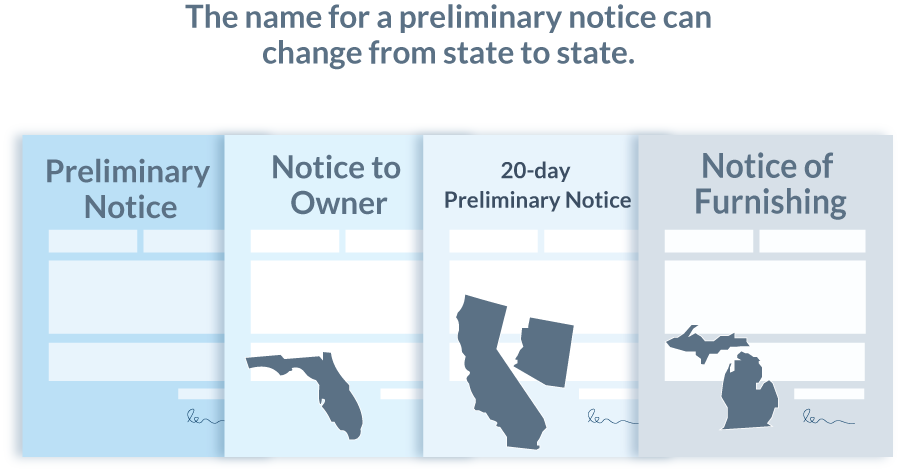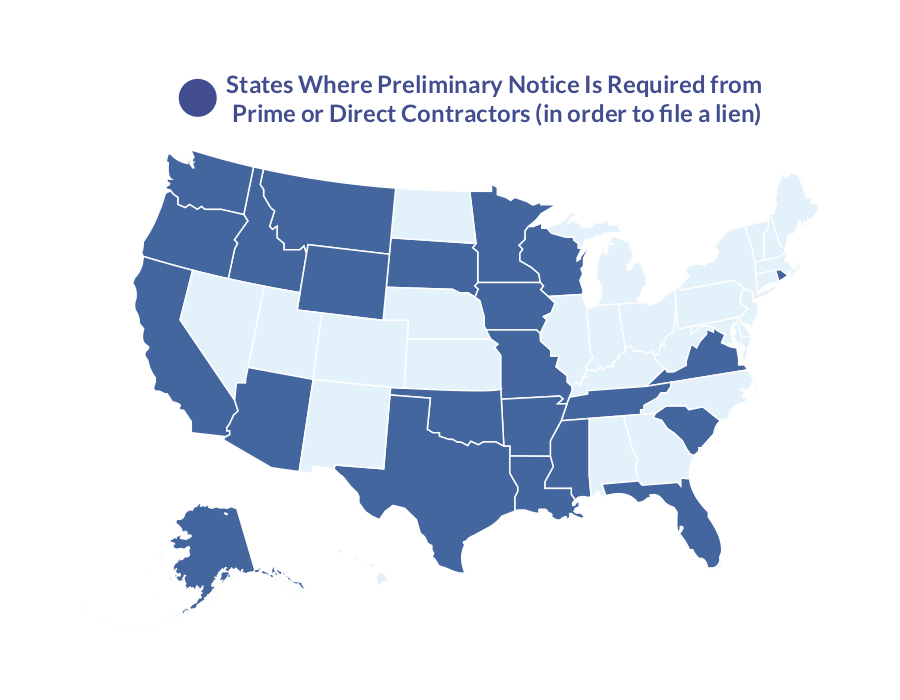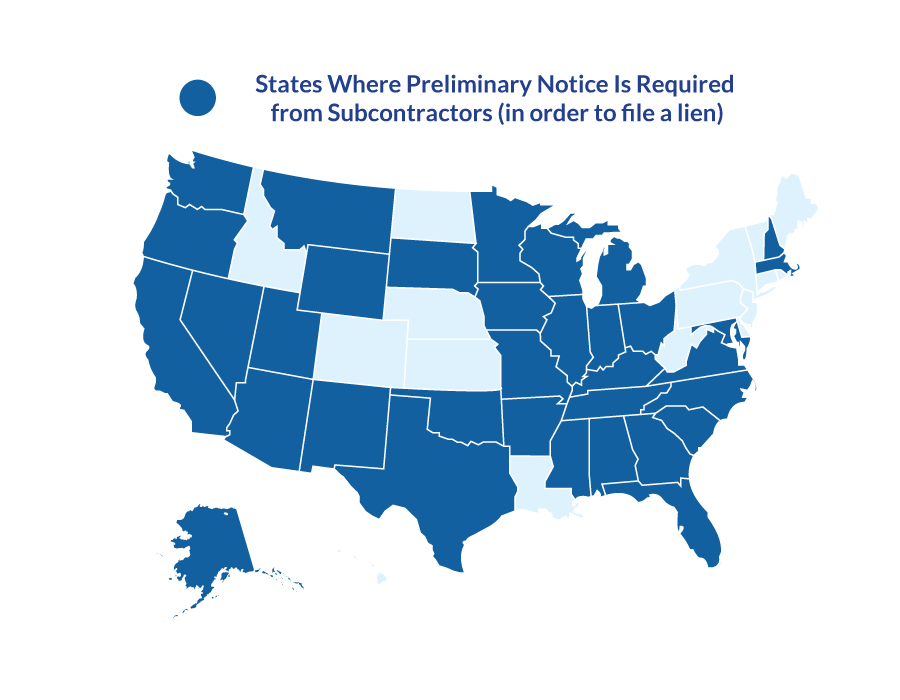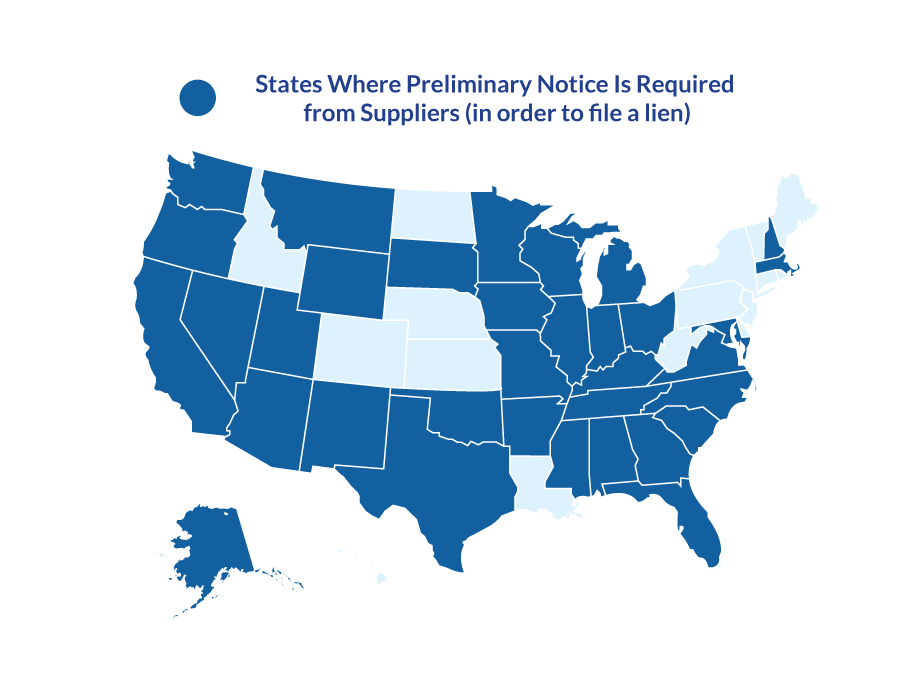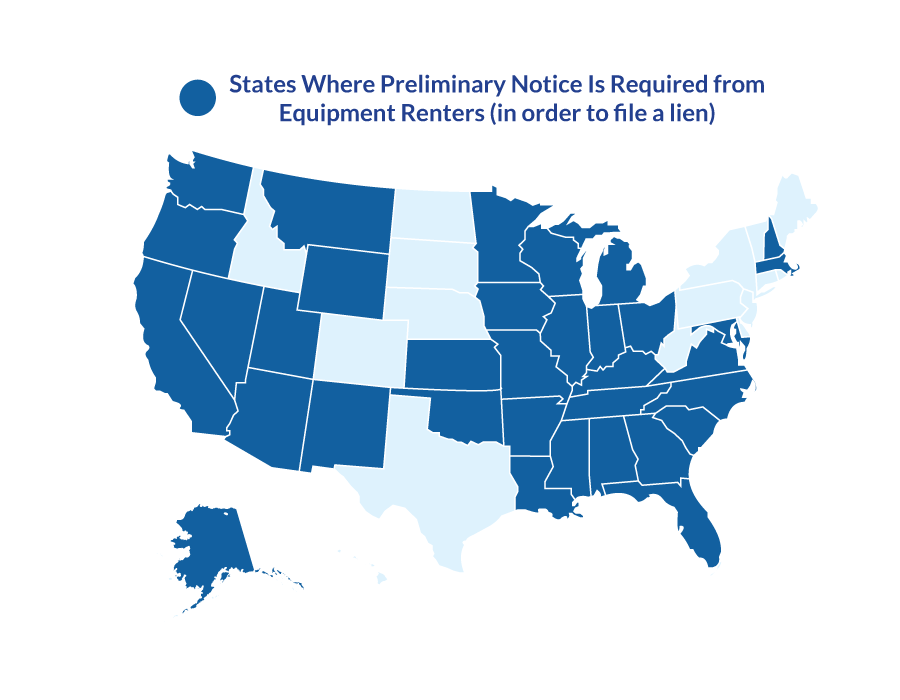
It’s a best practice in the construction industry to send a preliminary notice on every project possible. That’s the advice that we give to every contractor, supplier, general contractor, and equipment rental company. However, sometimes mistakes happen. Someone forgets to send a notice on a certain project. Someone decides not to send a notice for whatever reason. Then a nonpayment issue crops up further on down the line. And that begs the question: Can you still file a mechanics lien on a project without a preliminary notice?
Video: Can you still file a lien without a Preliminary Notice?
Preliminary Notice Requirements Vary by State & Project Role
Preliminary notices are an important part of mechanics lien law. One of the things that makes managing notices so difficult is that preliminary notice requirements vary from one state to the next. Not only that but within a given state, preliminary notice requirements will be different depending upon your role on the job site. In other words, in any one state, the preliminary notice requirements may be different for subcontractors as opposed to prime contractors or material suppliers.
And last but not least, even the name for a preliminary notice can change from state to state. As if construction law wasn’t complicated enough, right? Thus, in Michigan, a preliminary notice form is called a “Notice of Furnishing,” while in Florida it’s called a “Notice to Owner.” And in California and Arizona, a preliminary notice form is commonly known as a “preliminary 20-Day Notice”. This naming variation extends to several other states as well.
In the tables below, we break out preliminary notice requirements for all 50 states by job site role. For more detailed information on the notice requirements for each state, you can click on each state name below to pull up the Mechanics Lien and Notice FAQs for that state.
States that Require Preliminary Notices from Prime or Direct Contractors (in order to file a lien)

- Alaska
- Arizona
- Arkansas
- California*
- Florida
- Idaho**
- Iowa**
- Louisiana**
- Minnesota
- Mississippi***
- Missouri
- Montana
- N. Carolina
- Oklahoma**
- Oregon
- Rhode Island
- S. Carolina
- S. Dakota
- Tennessee
- Texas* ***
- Virginia**
- Washington**
- Wisconsin**
- Wyoming
* = Notice is required only if there is a lender on the project
** = Notice is only required for certain project types or contract amounts
*** = Notice is only required if it is requested, or when other people on the job file certain legal documents
States that Require Preliminary Notices from Subcontractors (in order to file a lien)
Infographic download: Subcontractor Preliminary Notice Requirements for all 50 States
- Alabama*
- Alaska
- Arizona
- Arkansas
- California
- Florida
- Georgia***
- Illinois*
- Indiana*
- Iowa*
- Kentucky
- Maryland
- Massachusetts (sub-subs only)
- Michigan
- Minnesota
- Mississippi***
- Missouri (written consent from residential owner required)
- Montana
- Nevada
- New Hampshire (not req. but best practice)
- New Mexico
- N. Carolina
- Ohio
- Oklahoma*
- Oregon
- S. Carolina
- S. Dakota
- Tennessee
- Texas (monthly notice)
- Utah
- Virginia
- Washington
- Wisconsin
- Wyoming
* = Notice is only required for certain project types or contract amounts
*** = Notice is only required if it is requested, or when other people on the job file certain legal documents
States that Require Preliminary Notices from Suppliers (in order to file a lien)

- Alabama*
- Alaska
- Arizona
- Arkansas
- California
- Florida
- Georgia***
- Illinois*
- Indiana*
- Iowa*
- Kentucky
- Maryland
- Massachusetts (sub-subs only)
- Michigan
- Minnesota
- Mississippi***
- Missouri (written consent from residential owner required)
- Montana
- Nevada
- New Hampshire (not req. but best practice)
- New Mexico
- N. Carolina
- Ohio
- Oklahoma*
- Oregon
- S. Carolina
- S. Dakota (suppliers to subs)
- Tennessee
- Texas (monthly notice)
- Utah
- Virginia
- Washington
- Wisconsin
- Wyoming
* = Notice is only required for certain project types or contract amounts
*** = Notice is only required if it is requested, or when other people on the job file certain legal documents
States that Require Preliminary Notices from Equipment Renters (in order to file a lien)

Note: For equipment rental companies that are hired by a party other than the real property owner on a private construction or improvement project.
- Alabama*
- Alaska**
- Arizona
- Arkansas
- California
- Florida
- Georgia***
- Illinois*
- Indiana*
- Iowa*
- Kansas*
- Kentucky
- Louisiana
- Maryland
- Massachusetts
- Michigan
- Minnesota
- Mississippi
- Missouri
- Montana
- Nevada
- New Hampshire
- New Mexico*
- N. Carolina
- Ohio
- Oklahoma*
- Oregon
- S. Carolina
- S. Dakota
- Tennessee
- Texas (monthly notice)
- Utah
- Virginia
- Washington
- Wisconsin
- Wyoming
* = Notice is only required for certain project types or contract amounts
** = Notice is optional, however, filing notice affords lien claimant extra protections
*** = Notice is only required if it is requested, or when other people on the job file certain legal documents
Why Send Preliminary Notice?

This does not mean that you will have to file a mechanics lien. What this means is that sending a notice preserves your right to file a mechanics lien on a project just in case something goes wrong with the payments you are owed on that project.
In fact, actually filing a mechanics lien is pretty rare. But when you need it, you better believe that you’re going to be glad that it’s there (“it” being the right to file the lien), because there’s no other tool that’s as effective as a mechanics lien when it comes to making sure you get the money you’ve earned on a project.
If You Failed to Send a Required to Send Preliminary Notice
So, let’s say you needed to send preliminary notice and you didn’t send it. What now?
Unfortunately, you’re probably dead in the water with your mechanics lien rights from a legal perspective. However, some states do allow late preliminary notices if you miss the deadline. In California, you can send a preliminary 20-day notice anytime during the project. But you won’t be able to protect missed payments for work you did more than 20 days before serving notice. Nonetheless, you can still file a California mechanics lien.
If you needed to send a preliminary notice but didn’t, and then file a mechanics lien anyway, the prime contractor, general contractor, or property owner may challenge the claim in court. At that point, if you were smart, you’d remove the mechanics lien voluntarily to avoid an adverse judgment (which would almost certainly occur).
To prevent this from happening, always send a notice, whether or not it is required!
Notice Exceptions Do Exist, Although Limited
Almost every state has exceptions to the preliminary notice requirements, but the circumstances are also almost always quite limited. For example, the state of Florida has some limited exceptions to its Notice to Owner requirements.
You can visit the Levelset Expert Center to ask about preliminary notice exceptions on a state by state basis. Our network of construction attorneys and payment experts across the country are standing by to provide free help.
If Notice Is Not Required, then You’re Okay
There are only a few states that don’t require a preliminary notice prior to a mechanics lien claim. If the project you’re working on is located in one of these states, then you can file a lien without having to send a notice first. However, we still recommend that you send a notice, even if you’re in a state where notice is not required. That’s because there are many more benefits to sending a notice other than just securing your lien rights.
Notice of Intent or a Lien Claim May Be Effective Anyway
Liens are very powerful. This power can result in the mere threat of a lien resulting in payment. It doesn’t hurt to send a notice of intent to lien to see if that shakes out payment, even if you will likely not go through with the lien filing, or even if any potential lien may not be enforceable. Actual lien notice filings are relatively rare on projects, and sending a notice of intent can rustle up payment more readily than you might think.
Along those same lines, just because a preliminary notice wasn’t sent (or wasn’t sent on time) doesn’t necessarily mean that a lien notice cannot be filed (practically speaking) even though it may be unenforceable and/or be successfully contested. If you go to file the lien, there usually won’t be a gatekeeper at the county recorder’s office stopping you. There are some exceptions, where a preliminary notice must be attached to the lien itself, or you must swear that it was property sent, but those circumstances are not the general rule.
It’s not a good idea to knowingly file an invalid lien
Since, typically, you are practically able file the lien, it’s up to the owner or general contractor to bring up your missing preliminary notice as a defense to have the lien removed. Many times, they don’t do that. Or the lien happens to get the debt paid before the lien is challenged. However, if the preliminary notice was a requirement and you failed to give the prelim notice, then your lien will likely be invalid.
This means not only that the court would likely toss out the lien, it could potentially open you up to liability for the property owner’s damages if you do not remove the lien if requested. It’s usually not a best practice to file a knowingly invalid lien, as it can back-fire into you owing more than you bargained for.
Going Forward, Start a Preliminary Notice Habit
As Jack Canfield once said, “Your habits will determine your future.” If you want a future where you get paid on time for every construction project, then sending preliminary notice on every job is one of the best habits that any construction business can start.
If you sent a preliminary notice that wasn’t necessary on a particular project, great! Your notice helped improve your communication and relationship with the GC and owner. If it was required, you can rest easy knowing that your payments are protected.
No matter which direction you decide to go from here, make sure you carry a preliminary notice with you.



